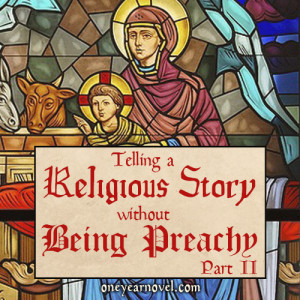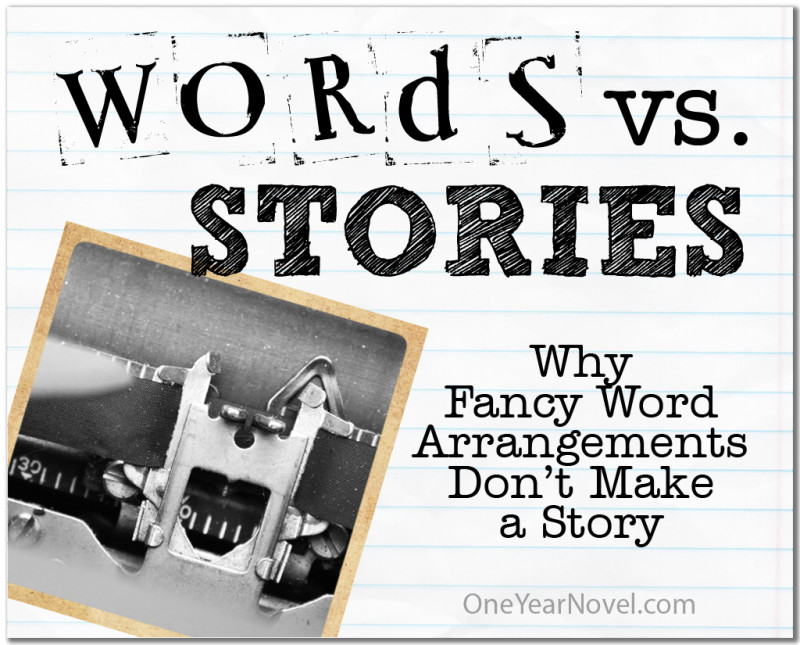Telling a Religious Story Without Being Preachy, Part 2
By Rachel Garner, Staff Writer
Last week, we looked at the problem of “preachiness” in Christian stories, and two major elements to eliminate to avoid coming off as preachy in your own work: Mouthpiece Syndrome and the Willing Recipient.
This week, I focus on some other practical ways to address the problem of preachiness, especially when editing important thematic scenes.
Choose Emotion over Eloquence
When it comes to writing these scenes, dialogue in large paragraph chunks is almost always a bad decision. Humans are rarely able to wax eloquent about those things that matter the most to them. They’re also not likely to reveal every single thought they have, especially at their most vulnerable.
Writing moving dialogue requires cutting through everything a character is thinking to find only what a real person would actually say, which is often (not always!) very different.
It’s normal to be reluctant to eliminate eloquent phrasing, especially if you want the gospel to be thoroughly understood. But your goal is to move your reader’s heart, not dazzle him with perfect formulations of religious belief. You are also more likely to earn his respect and interest with realistic portrayals he can care about, than eloquent ones he can’t.
Use Inner Voice
Sometimes, the eloquence you’ve removed from the dialogue can be moved to inner voice. In editing my thematic scene, instead of my hero saying everything going on in her heart and mind, I instead included small and specific moments in her narration:
This man sitting before me, this man not much more than a boy, beaten for that name and caught because of my deception, held my hand and spoke in awed tones about the creator of the universe.
Inner narration suggests a bit more time to process and react, and so it can afford to be more polished. It is also more private, so thoughts that would sound strange if they were said out loud can be believably conveyed in inner narration mode. Still, use eloquence sparingly.
Don’t Confuse Vulnerability with Copious Detail
Scenes about salvation or other important themes are by their nature vulnerable for all parties involved. But be wary of making characters too vulnerable. While it may make sense for a mentor to communicate to the hero that she can relate to the hero’s thirst for revenge, the mentor is not likely to describe her own revenge story in detail. A choice to be vulnerable is to decide that what you are discussing is more important than your own emotional or physical safety. While characters can and should be vulnerable at times, they are unlikely to open up in detail about everything in their hearts.
It may seem like the perfect cap to your point about forgiveness for your mentor to talk about the excruciating way her friend died and how she still forgave the killer—but it is not very human. Humans avoid pain and avoid things that may cause pain. It’s going to take a lot to say, “He killed my friend,” never mind voicing any details.
Tread Carefully around Dark Subject Matter
If the characters have dark experiences in their past, whether depression or abuse or crimes, you may assume you need to write about their former despair in detail in order to help the reader understand the magnitude of this change of heart the character is undergoing.
Writers sometimes pride themselves on the inventiveness of their characters’ terrible pasts—and after all, the OYAN curriculum even suggests giving “undeserved misfortune” to your hero—so it is understandable to assume that addressing dark stuff in a meaningful way means being graphic. But this would be a mistake.
Understatement is usually much more emotive than detail, and much less prone to accidentally coming off gratuitous or melodramatic.
Too often, instead of alluding to the dark backstory in brief, heartbreaking revelations, writers create a scene where the wounded character suddenly displays everything in bulk, so the reader can truly appreciate how depressed and depraved he once was (or still is). As I wrote about vulnerability, it is unlikely that this would actually happen. Characters talking in detail about dark parts of their past or their soul either suggest that the event is very far removed from them or that it wasn’t as dark as it is being suggested. More often than not, it is the latter unintended message that readers will get, and the scenes will strike the reader as unnatural or melodramatic.
Humans tend to understate their biggest sins and fears, even when trying to be honest. Make sure your characters do likewise.
Reformulate Statements as Questions
Consider rephrasing statements as questions. Readers don’t like to be told things, they liked to be asked to consider things. A very simple change I made in a scene, for example, was to remove Marian’s dialogue:
“I’ve never done anything deserving of love.”
and replace it with Robin’s approach:
“Do I deserve this?” He held out his hands: left hand in a splint, right bound, covering deep burns. “Do I deserve what happened in Nottingham Castle?… Knowing that, how can you possibly say I didn’t deserve it? Or that I didn’t deserve to die as Ralph intended?”
This changes the tone of the conversation about the concept of undeserved love. It’s being questioned and considered, not blithely accepted. It is too big and too important a concept to charge through without any expression of doubt.
Try a Different Character
As demonstrated above, sometimes it can be helpful to have a different character approach the concept. It offers a different angle on the scene. Mix up who introduces each topic, and make them interact with each other. You may consider your mentor the default for expressing wisdom about facing your fears, but that’s precisely why those same words in a different character’s mouth could make more impact.
Whereas in my first draft, my characters just spoke large paragraphs at each other, I made an effort in revisions to make those important conversations much more interactive. The characters got to discuss, contradict, and even argue the concepts in their own unique ways.
Learn to Detect Stock Religious Language
A problem related to the Willing Recipient is Too Perfect Language. Be careful of putting stock religious language and phrases in the mouth of a “new convert” character. This is especially true when discussing salvation. For example, people who grow up as Christians talk differently, and sometimes a bit weirdly. Don’t give all of those same phrases to someone who is new to this idea, even if the character has chosen to accept it. A new Christian may be confused about the idea of Jesus being “in her heart,” or may not know the “proper” place to put an “amen” when praying. Let the characters express their understanding of the gospel through their personality and experience.
Here’s another example from my own revisions:
Version #1: “I could say I’m sorry and leave Sherwood forever, but there’s another thing that I’m sure Jesus wants me to say. I’ve found truth, and I’ve found love—I don’t need anything more here on earth, I don’t deserve anything more. If I never come back here—it’s all right, I tell myself repeatedly, I still have Jesus.”
Version #2: “All He wants is for us to…love Him back. And for us to love each other. By copying Him and His sacrifice.”
He looked at me, eyes that startling blue in his pale face. “That death, Marian. That’s love.”
I let out a sob and pulled my hand away from him, covering my face.
It hurt and I couldn’t breathe. That’s love.
Love hurts.
You’ll notice that in this exchange I also switched characters, shortened the dialogue, and used some internal voice.
Accept the Mess
It is okay for characters to be distracted, for a scene to derail because of the frailty or even the beauty of humans. Maybe they’re traveling through a forest and one of them accidentally slaps the other in the face with a tree branch. Maybe one pokes fun at phrasing in the Bible that sounds weird to outsiders. Maybe both launch into a panic because they’ve forgotten they were supposed to pick up the kids at 3 and it is now 3:30. Unless your scene takes place in Aslan’s country or something, your characters still live on earth. They’re still human.
Humans are unique and they are distractible, and through all their important discussions they should remain themselves.
…
What stories convey religious themes, character change, or a biblical message in a way that you find believable and moving?
…
Rachel was one of the seven students—or self-labeled “guinea pigs”—who took part in the pilot class for The One Year Adventure Novel. Known as “Nairam” in the extended OYAN community, Rachel is an example of dedication to her craft and a gifted editor. She is also a kind and forthright writing mentor to students at every level of the program, and a Story Coach. A homeschool graduate, she is now in college studying history. When not hiding out in the medieval England section of her school library, she edits her Robin Hood retelling and pretends that nine years is definitely not too long to spend on a single writing project.



